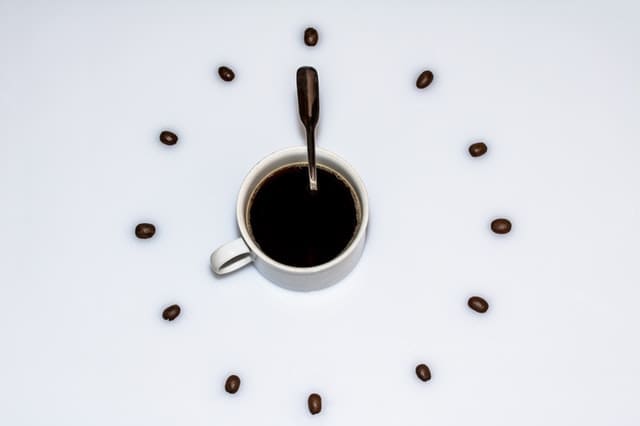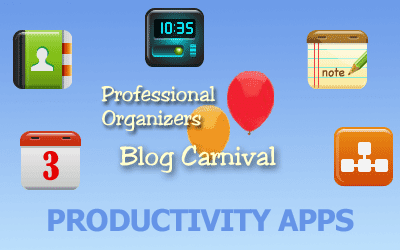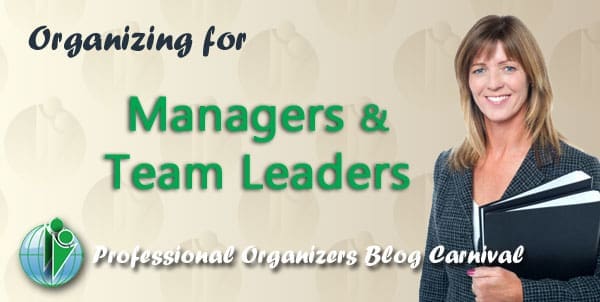Coffee: A Workplace Saviour Or Productivity Killer?
This page may contain links to Amazon.com or other sites from which I may receive commission on purchases you make after clicking on such links. Read my full Disclosure Policy

I don’t publish many articles about organizing or productivity here, because I figure you guys are already experts in that area. But when Nathan Sharpe of Biznas approached me with his article about the pros and cons of coffee in the workplace, I couldn’t resist! Because coffee…

The relationship between coffee and productivity is not a smooth-sailing one. While millions of coffee enthusiasts around the world swear by the productivity benefits they derive from this humble cup, there are also many non-believers who proclaim that coffee in the workplace deduct from the overall performance of employees.
While many workplace issues have been amazingly resolved in recent years through technology and by automating different business processes, it can be confounding why coffee is still taking the blame for loss of productivity.
Why coffee takes the blame
One of the things employees probably dread the most is having their managers look for them while they are on their coffee breaks. Not being on their desks at that exact moment is often a gateway to many assumptions and misconceptions that they spend every working hour in the office break room or at the coffee shop around the corner.
One study even supported this by revealing that Britons waste an average of 18 hours a year to get a cup of coffee from the local shop. Does it really take so much time to get coffee? Consider this: If employees need to buy coffee outside, the total time they need to straighten up their clothes, maybe put makeup, take the elevator, walk to the shop, order their drink, wait for it and then walk back to the office can be quite lengthy.
Even if a company only has 10 employees, the 180 hours lost is already equal to more than twenty 8-hour days of work lost in a year. For much larger companies, this number will obviously go up.
When coffee is often not the culprit
These findings stated earlier are often enough for most business managers to crucify coffee and put limiting rules on taking breaks. After all, when business productivity goes down, it is easier to blame what they’re seeing or not seeing right before their eyes.
However, there are also many cases when coffee breaks are not even the reason for lost productivity time. There are many other workplace hold ups that usually cause unforeseen delays. These problems do not render any upside or benefit to the employees or the company.
On the other hand, targeting coffee may be counterproductive because the benefits it brings usually outweigh the disadvantages.
How coffee boosts productivity at the workplace
Taking an office coffee break is considered a part of the routine in the workplace. Many people drink coffee out of habit without really thinking twice about how it affects the way they work. It is then interesting to look at the often overlooked benefits this hot cup of joe may bring to the table.

Coffee boosts energy levels and alertness
There are many triggers that can cause employees to feel sluggish or stressed in the mornings. Partying the night before, insufficient sleep, horrible traffic, or plain tiredness are common reasons why employees may feel slow or heavy-eyed.
In these situations, coffee can be of help. It has been scientifically proven that coffee can increase energy levels and make people feel less tired. Another separate study also found that coffee can improve a person’s alertness. When employees are alert, they are more likely to focus on their work and complete their tasks earlier.
Coffee can help improve reaction time and memory
Aside from feeling more energised and alert, coffee has also been shown to help improve performance, specifically on tasks that require brain power. It is not uncommon to feel bored or sleepy during a long meeting. The dimmed lights, the hum of the projector and the rambling monotone of the client’s voice can present the perfect combination to make anyone space out.
Drinking coffee may just be the solution to avoid these embarrassing situations. According to studies, coffee has been shown to help improve focus and memory. This can result to less forgotten details, no more missed client briefs and better decision making at work.
Free coffee is a sought-after employee perk that affects employee happiness
Most companies offer free coffee to their employees, however, not many would actually go the extra step to provide great-tasting varieties. This is what makes employees go out of the office to get a decent cup.
If companies invest in a reasonable office coffee machine that can dispense fine-tasting coffee, this would actually contribute to the employees’ satisfaction levels. A survey has found that free coffee is still one of the sought-after employee perks that affect how they value the company they work for. Happy and satisfied employees tend to be more productive at work than employees who feel undervalued by their bosses.
Coffee breaks can help foster positive employee relationships
Employees working non-stop may seem like best-case scenario to increase company productivity, however, according to science, this may actually do more harm than good. When employees work continuously for long periods, they tend to slow down and they become more prone to mistakes. This also takes a toll on their physical form causing neck and back strains.

According to research, when employees take micro breaks, they get the opportunity to recharge and refocus. This way, they can function more efficiently throughout the workday. Standing up from their desks also promote better blood circulation and is better for their overall health.
Office coffee breaks are also venues for employees to socialise and create positive relationships with one another. There’s nothing more toxic than coming to an office filled with misunderstandings, miscommunication and conflicts among employees. Chats over a cup of good coffee is the perfect opportunity to loosen up and know one another better.
When colleagues are able to develop healthy relationships, they are more likely to work together well and also be happier at work. At times, these informal meetups at the coffee break room can also jumpstart creative brainstorming sessions and produce amazing results.
Brewing the Perfect Compromise
While coffee undoubtedly has several benefits and advantages, time being lost or wasted at work is also a problem that should not be taken for granted. While managers would love their employees to always feel alert and energised, they also don’t want to lose precious time that they’re paying for. So, is there a middle-ground?
One reason why coffee breaks are seen to disrupt productivity stems out from the amount of time it physically takes for employees to get a cup. A great solution to resolve this is to install a reliable office coffee machine that will lessen the time it takes for employees to get their dose of caffeine. There are machine models that can dispense gourmet-tasting coffee in a matter of seconds. Not only does this save the employees’ time, it is also a money-saver for them.
Coffee drinking is already a fundamental part of corporate culture. Therefore, finding ways to maximise the benefits it delivers is a great way to increase productivity in the workplace.




I am a fan of coffee. Since I don’t work in an office, it doesn’t really impact my productivity. I drink decaf, so it isn’t really about the caffeine hit. For me, a couple of hots cups of coffee makes my morning devotions and computer work more pleasant. Then, after this calm time to focus, I’m off to clients. I agree that coffee should be easy to grab… otherwise, people might head out to a coffee shop, and that really does take time away from the tasks at hand.
Thanks for sharing your personal coffee insights, Seana!
It’s so funny because as I was reading your post now, I’m sipping a cup of coffee. What’s particularly funny is that I normally drink tea, but this morning I chose decaf coffee. I’m sensitive to caffeine, so even with the decaf, I feel the energy ping.
As far as coffee breaks in the workplace, I’m a fan. It’s important to take those micro-breaks (love that term!) for recharging and also to connect with other people. Having a coffee station in-house seems like the smartest way to go. I don’t work in an office, but even when working one-on-one with clients, there are times when they need to take a break (for coffee, tea, water, or something else.) Then we come back to the work refreshed and ready to focus again.
I thought you might be a tea drinker! I bet that the breaks benefit you as well as your clients. 🙂
I am more of a tea drinker. I can’t get past the bitterness of it. But in the past year, I found a light cold brew coffee that I can store in my fridge. It can be stored in my office fridge and can easily be pull when I need it minimizing the lost time making the coffee. I found that now that I switched to Monk Fruit from sugar it has helped me not have issues at nighttime when I drink coffee. It’s a win-win. =)
I’ve never heard of Monk Fruit before, but I don’t take sugar in my coffee or tea, so probably won’t be checking it out any time soon. Thanks for sharing!
Love this post. I am a fan of coffee, but I don’t see if as so integral to my work. I do remember my corporate days though and it was a big part of office life – good and bad.
I have those memories too, Janet! Maybe some day we will be able to sit and have a coffee together.
As a coffee lover, I’m happy to see this post! I love how it smells, too. Coffee also helps me get ready to start the day and keeps me focused. That said, there is science behind why coffee (or caffeine, more specifically) helps us to stay alert. It blocks Adenosine, the chemical that makes us calm down and get sleepy. Can you tell I’ve done some digging around about this? LOL
Were I a CEO with a team, I’d certainly consider encouraging a culture where coffee breaks are a normal part of the day. These breaks can recharge team members and give team leaders a chance to connect with their peeps on a different level.
That’s not to say we should all down a whole pot of coffee or drink it if it affects us negatively. Just throw some Earl Gray (or water) in your cup and take that break with your colleagues. =)
P.S. I’ve also tried coffee naps. Those work pretty well, too.
Deb, I actually thought of you when I was considering this post! You’ve got some great insight into the subject.
What is a coffee nap?
Glad you thought of me. =) A coffee nap is when you pair coffee with a nap. You drink coffee and then take a short nap (no more than 30 minutes) so that you can boost your energy when you wake up. Think you might give it a try?
I don’t really take naps, so probably not. I would be more likely to take a nap, then drink a coffee to help me wake up afterwards. Interesting…